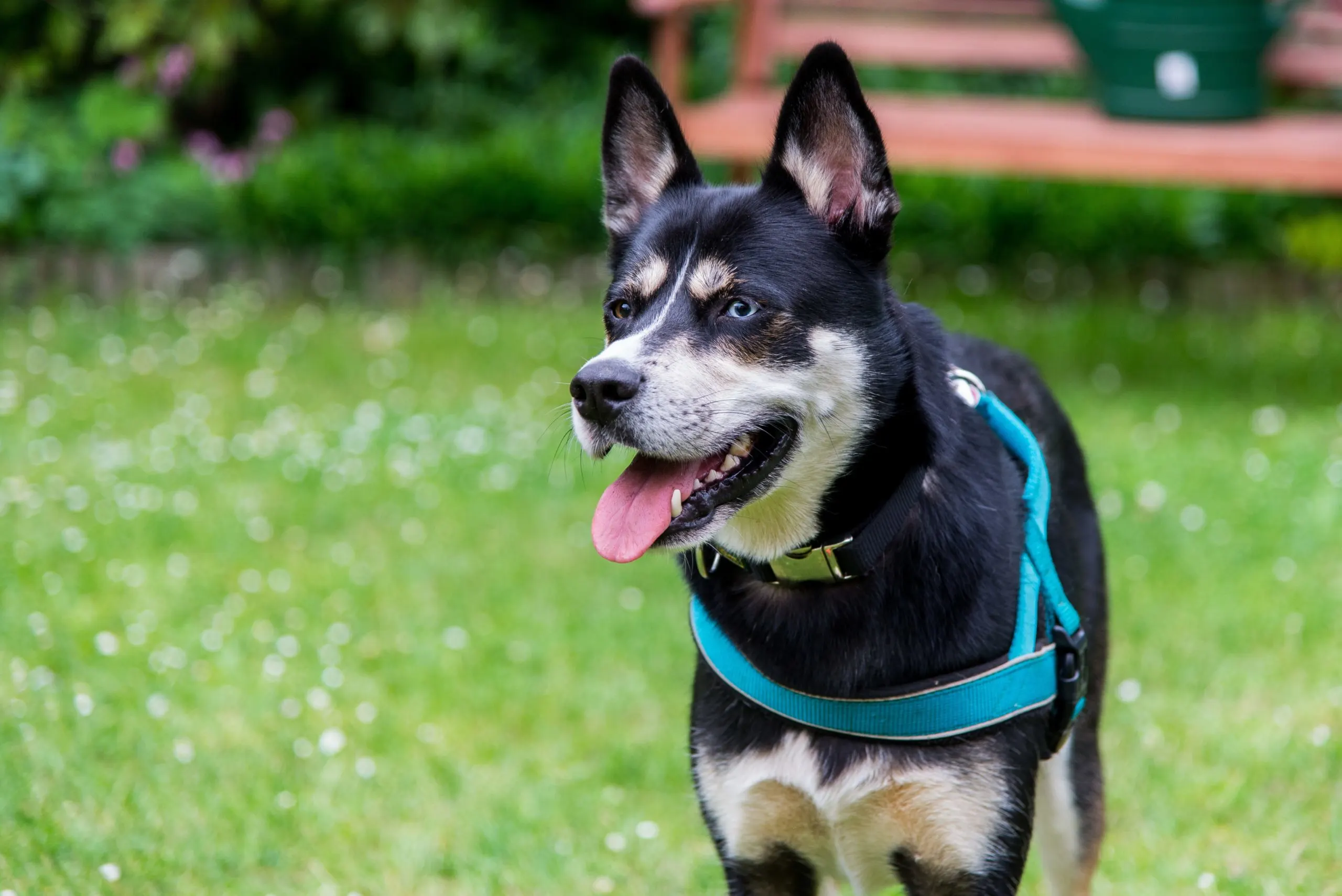In theory, the Rottweiler Husky mix should be the best of both worlds. It combines the bubbly personality of the friendly Husky, with the disciplined demeanor of the calm Rottweiler. But the resulting dog doesn’t always end up being what you expect. So if you are in the market for buying a Rottsky puppy, but you aren’t sure what you should expect, here are 11 things everyone should know before getting a Rottweiler Husky mix.
1. What is a Husky Rottweiler mix called?
If you are a fan of dogs, and in particular mixed dog breeds, then you probably know by now that most of them have a few, absolutely adorable names. Some of my favorites are Bugg (Boston Terrier and Pug mix), Dorgi (Dachshund and Corgi), or Papijack (Papillon and Jack Russell Terrier).
But are there any cute names out there for the Rottweiler and Husky mixed breed? Of course, there are. The most popular one seems to be ‘Rottsky’, but other names also include Husweiler (doesn’t sound quite right, I know), or simply Siberian Husky Rottweiler. We will stick to the most popular nickname, which is most commonly used here in the United States.
Are Rottskies good dogs?
They absolutely are. But they won’t be the ideal choice for everyone. We will explain why that’s the case later in the article. However, you have to understand that this is the case with any dog breed or crossbreed. You have to pick a dog that will fit your personal lifestyle.
For example, Rottskies are active canines. They are the product of two working breeds, after all. So if you are looking for a tiny lap dog that is fine with spending most of his time inside your apartment, then this isn’t the pup you are looking for. So while this is generally considered a good and balanced hybrid dog, it won’t fulfill the expectations of every potential dog owner.
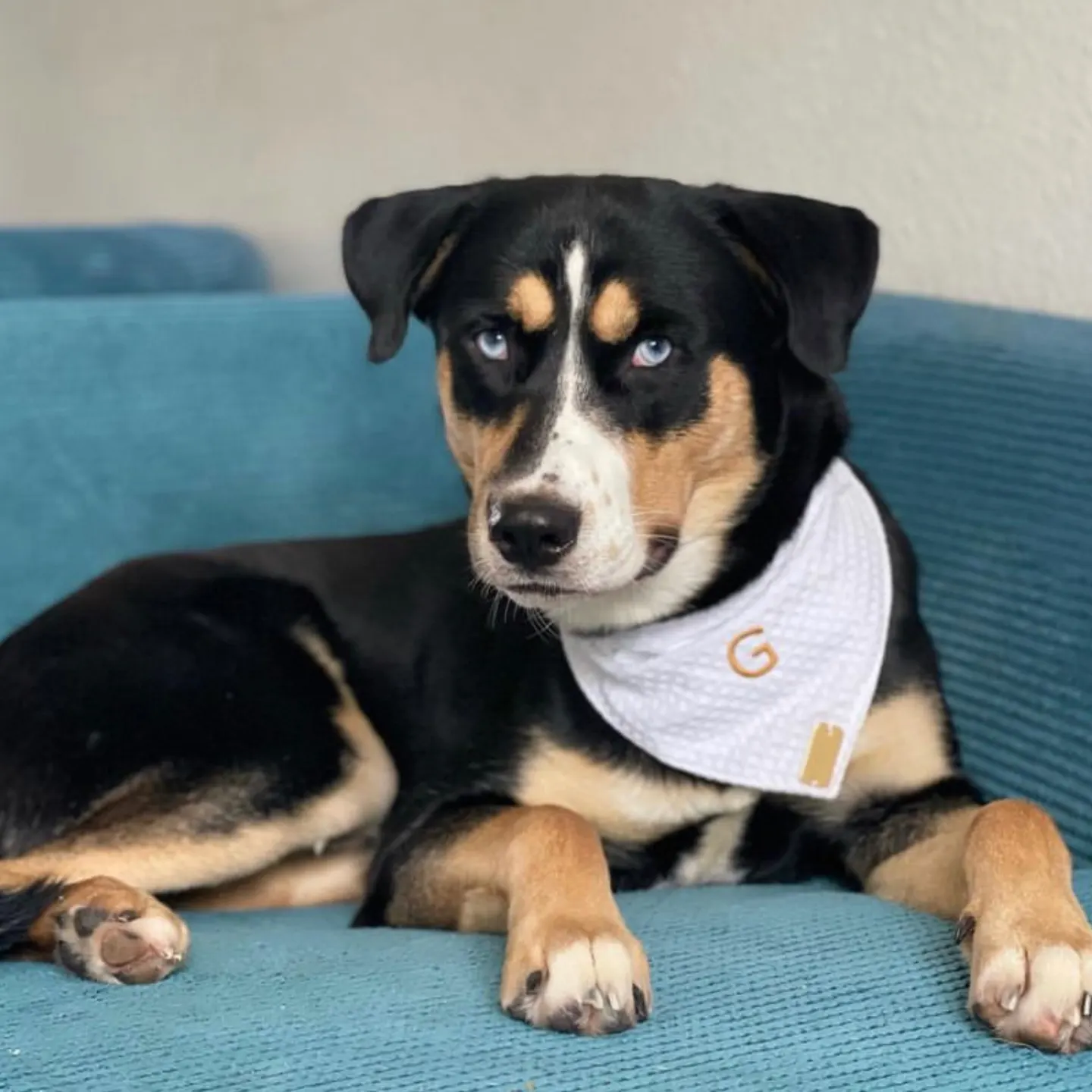
Source: Instagram (@gooserottsky)
2. Personality & temperament
It’s almost impossible to predict the temperament and personality of your future Rottweiler Husky mix puppy. That’s because Siberian Huskies and Rottweilers are opposites personality-wise. Huskies are social, playful, and friendly canines. Rotties are calm, reserved, loyal dogs that have a hard time around strangers. Some dogs will be more like Huskies, while others will be more like Rottweilers.
No matter what traits your puppy inherits, the single most important thing that you can do when it comes to personality and temperament is to make sure that you socialize your dog early on. That will make their future interactions with people and other animals a lot more predictable. Most Rottskies are friendly dogs that will like anyone who gives them a nice treat and a few pats on the head.
3. Size & Appearance
When it comes to their appearance, just like with any other cross breed, it’s hard to predict the exact look your dog is going to inherit. Especially if it’s an F1-generation puppy. However, in most cases, these dogs have the muscular and bulky body of a Rottie, with the adorable head of the Husky, including their stunning blue eyes.
Both of the parent breeds have double coats, so the Rottsky will too. That means that they will shed throughout the whole year, so you better invest in a good vacuum cleaner. While the Rottie has a short and glossy coat, the coat of the Husky is medium length and well-furred. Most Rottskies inherit the glossy coat of the Rottie, with their signature black and tan coloring.
How big do Rottweiler Huskies get?
When it comes to the size, and how big your Rottsky will be, it mostly depends on their gender and the genes that are more dominant in your canine. Expect them to be medium-sized, muscular dogs. Males reach a height of 22 to 26 inches, with a weight of 60 to 110 lbs. Female Rottskies range in height from 20 to 25 inches and weigh around 50 to 90 lbs.
| SIZE CHART | ||
| GENDER | HEIGHT | WEIGHT |
| MALE | 22-26 inches | 60-110 lbs |
| FEMALE | 20-25 inches | 50-90 lbs |
4. Lifestyle and family compatibility
Another big aspect that you have to consider before getting a dog is if that dog would fit into your family and lifestyle. What are you looking for? How much time do you spend at home? Do you have children? How old are they? Do you have other animals in your house? These are all things that you have to consider.
No two dogs are the same, so there will be some variation from Rottsky to Rottsky. Some will be more independent, some will enjoy kids more than others, and some won’t like to be around kids at all. You have to understand that this is a demanding crossbreed. They won’t be the best option for you if you spend almost no time at home at all. Let’s discuss the three most important topics: space, kids, and other animals.
Can Rottskies live in apartments?
This is always such a tricky question to answer. You have to consider how active and big these dogs are. That means that they need space and physical activity. Sure, if you live in an apartment near a dog park, you can still take your dog out on a daily basis so that he can get the daily exercise that he needs. But most Rottskies would still prefer a house with a yard in a more rural area.
However, not all Rottskies are equal, and not all apartments and families are the same as well. If you live in a bustling city, and you don’t really have any place nearby where your dog could get the exercise that he needs, this breed isn’t the best fit for you. But if your dog’s exercise needs are fulfilled each day, and he has enough space in your apartment to feel comfortable, it should be more than fine.
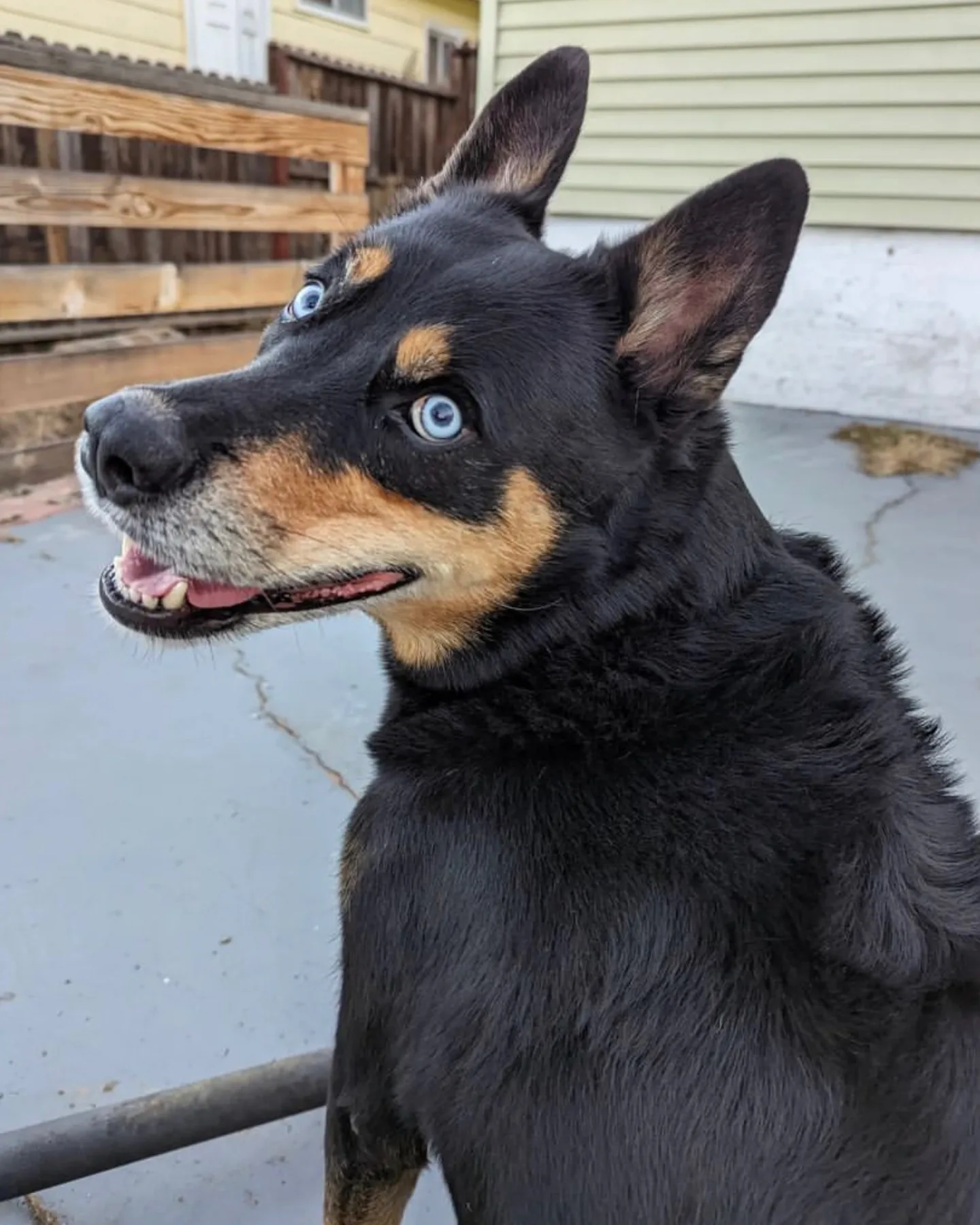
Source: Instagram (@luna_tuna_the_rottsky)
It’s more about you doing the best you can that all of your dog’s needs are met. No matter if you live in a huge mansion or a tiny apartment. Dogs love us for who we are, and not for the property that we own. So even if you live in a smaller place, there is no one who can tell you that you can’t own a Rottsky. You just have to make sure that he is living his best, working-breed-dog life.
Are Rottweiler Husky mixes good with kids and other animals?
When it comes to kids, Rottweilers and Huskies are on similar parts of the spectrum. Rottweilers, even though they look intimidating, actually enjoy kids. They love to be around them, they love to protect them, and they love to play with them. But you have to understand, these are strong dogs. Little kids and such powerful dogs sometimes don’t mix together too well. Especially if your kids aren’t used to being around dogs. So this would be a better option for families with older kids.
As for other animals, it can be tricky. Huskies are pack animals, and they love to be around other dogs. But they mostly like to be around other Huskies. Rottweilers are okay with it too, but they prefer to be around their humans. When it comes to other animals, the most important thing is that you socialize with your dog. Either dogs or cats, start slow and introduce them one by one. Don’t leave them alone, and make sure all parties are safe.
5. Exercise & Training
One of the most important aspects of your dog’s behavior is training. Rottweilers and Huskies are both incredibly intelligent dogs, that need to have a strong leader who would guide them through the world. If they don’t, their stubborn side could win over, and they could start displaying the worst sides of both breeds.
Huskies can be demanding, they fall into destructive behaviors when they are bored, and they are notorious for destroying the furniture of their owners. On the other hand, Rottweilers are known for being overly protective.
That’s why we would only suggest to someone who already owned a similar breed to adopt a Rottsky puppy. If you are a first-time dog owner, adopting this modern hybrid wouldn’t be a good idea. Sure they have plenty of good traits as well, however, they need to know who the alpha is in order to display them.
How much exercise does a Rottsky need?
Let’s just say that if you are a couch potato, this breed will give you a hard time. The Rottweiler Husky mix needs daily activity in the shape of walks, hikes, runs, trips to the dog park, or different interactive games. Considering one of their parent breeds is a sled dog, these dogs can walk and run for long distances. That makes them amazing jogging buddies if you are on the lookout for a workout buddy.
These dogs have a strong prey instinct, so make sure you keep them on a leash when you go outside to exercise. Otherwise, they will start running after your neighbor’s cat or some squirrel at the dog park. When it comes to the amount of exercise that they need, it will slightly depend from dog to dog. However, the minimum would be around 60 minutes of exercise (so not just easy-paced walking) per day.
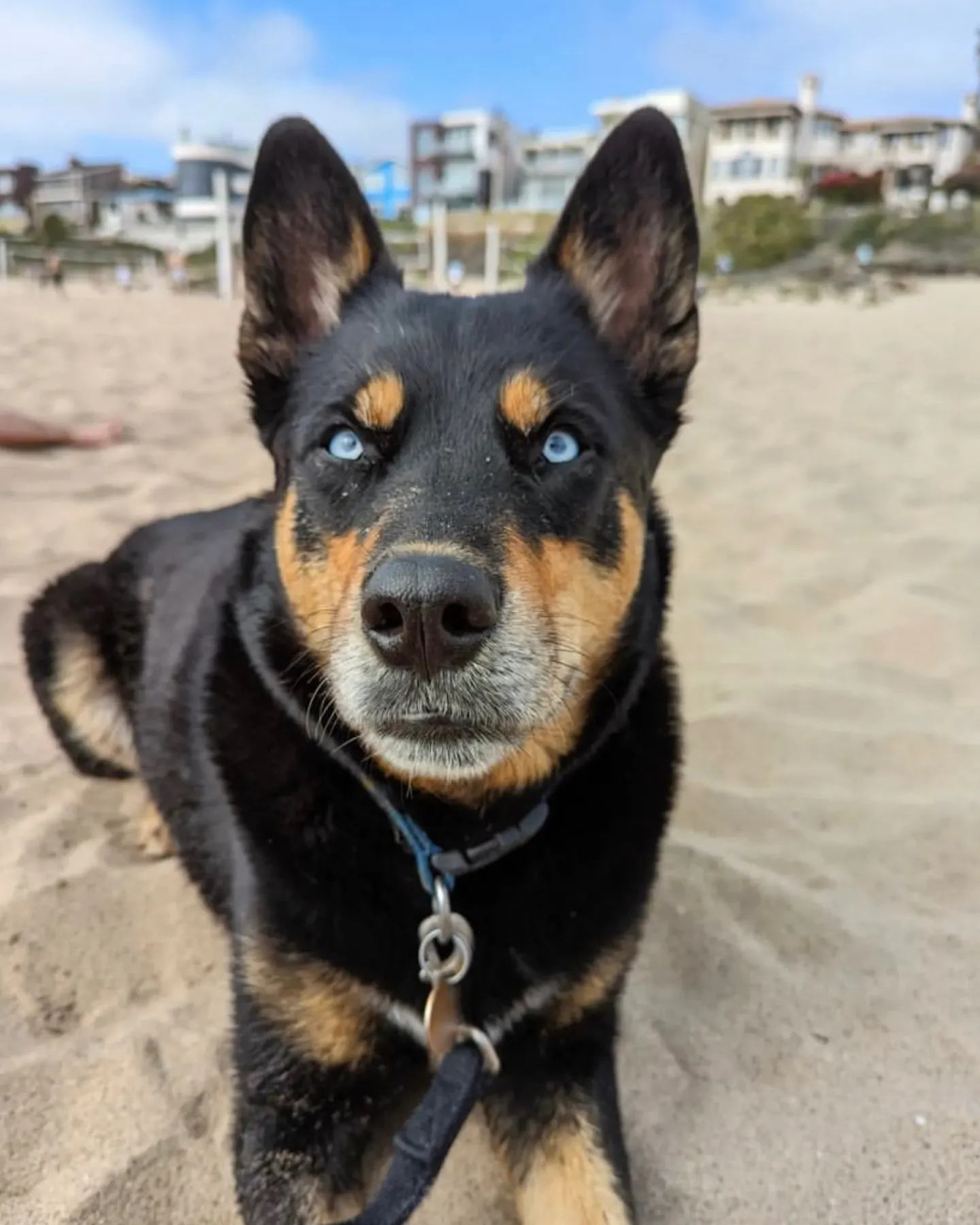
Source: Instagram (luna_tuna_the_rottsky)
How to train a Rottweiler Husky mix?
When it comes to training techniques, Rottskies absolutely thrive on positive reinforcement. That means that you should praise and encourage everything that they do right, and ignore everything that they do wrong. This method includes a lot of dog treats, games, cuddles, and verbal praise.
However, because most dogs are food-motivated, and the Rottsky is no exception, they will learn the fastest when food and treats are involved. Immediately reward your dog after he did something good so that he can connect that action with getting a treat.
Socializing a Rottsky
Any dog needs socialization. No matter if you own a Chihuahua, a Pug, a Goldendoodle, or a Rottsky. You will simply have to socialize your dog. Some breeds are a bit more social and have an easier time around humans, while other dogs are more reserved. When it comes to a Rottsky, it can be a bit complicated. Rottweilers are sweet and gentle canines, but they usually aren’t the type to love being around new people. On the other hand, Huskies are known for being social and pack animals.
That’s why we can’t really tell you how your Rottsky is going to turn out. You are probably going to get a puppy that is somewhere in the middle. However, by exposing your dog to a lot of different people, animals, sounds, smells, and places early on, he will feel a lot more comfortable with different social situations in the future. If you adopted an adult or senior dog, socialization is still possible, however, it could take a lot more time and effort than it would with a puppy.
6. Diet & Nutrition
This is the offspring of two working parent breeds, so it’s no wonder that the Rottweiler Husky mix is an active breed as well. Due to their high activity levels, these dogs need a lot of high-quality dog food that is rich in protein, but also carbohydrates, fatty acids, minerals, and vitamins. If you decide o feed your canine dog kibble, make sure you buy food that is actually rich in proteins, and not just in filler foods like corn. Always check the ingredients or ask your vet for dog food recommendations.
Rottskies need around three cups of dog kibble per day, with their food having a protein percentage of at least 25. Because these dogs are prone to bloat, you should make sure that you divide their food into multiple smaller meals per day. Also, make sure they don’t exercise right after eating. If you prefer to feed your dog home-cooked meals, make sure he eats enough protein and gets the right amount of calories. A dog of this size and activity level needs on average 2000 kcal per day.
| NUTRITION | ||
SIZE | CALORIES | MEALS PER DAY |
50-80 LBS | 1300-1800 KCAL | 2-3 |
80-110 LBS | 1800-2200 KCAL | 3-4 |
7. Grooming
Let us just warn you that you will have A LOT of grooming to do. No matter the season, you will have to brush daily. That’s because both Rottweilers and Siberian Huskies shed a lot, which means that the cross breed between these two has no other option as well. So if you want to avoid dog hair being all around your house, furniture, clothes, and shoes, make sure that you brush them on a regular basis. And invest in a good vacuum cleaner.
These dogs love to be outside, and it isn’t rare for them to get dirty. So make sure you give them a bath every 6 to 8 weeks. Don’t overdo it, as that could strip their coats off their natural oils. Besides their coat, you will also have to make sure that you brush their teeth, trim their nails, and clean their ears on a regular basis. Teeth cleaning shouldn’t be overlooked or forgotten, as they are prone to periodontal disease.
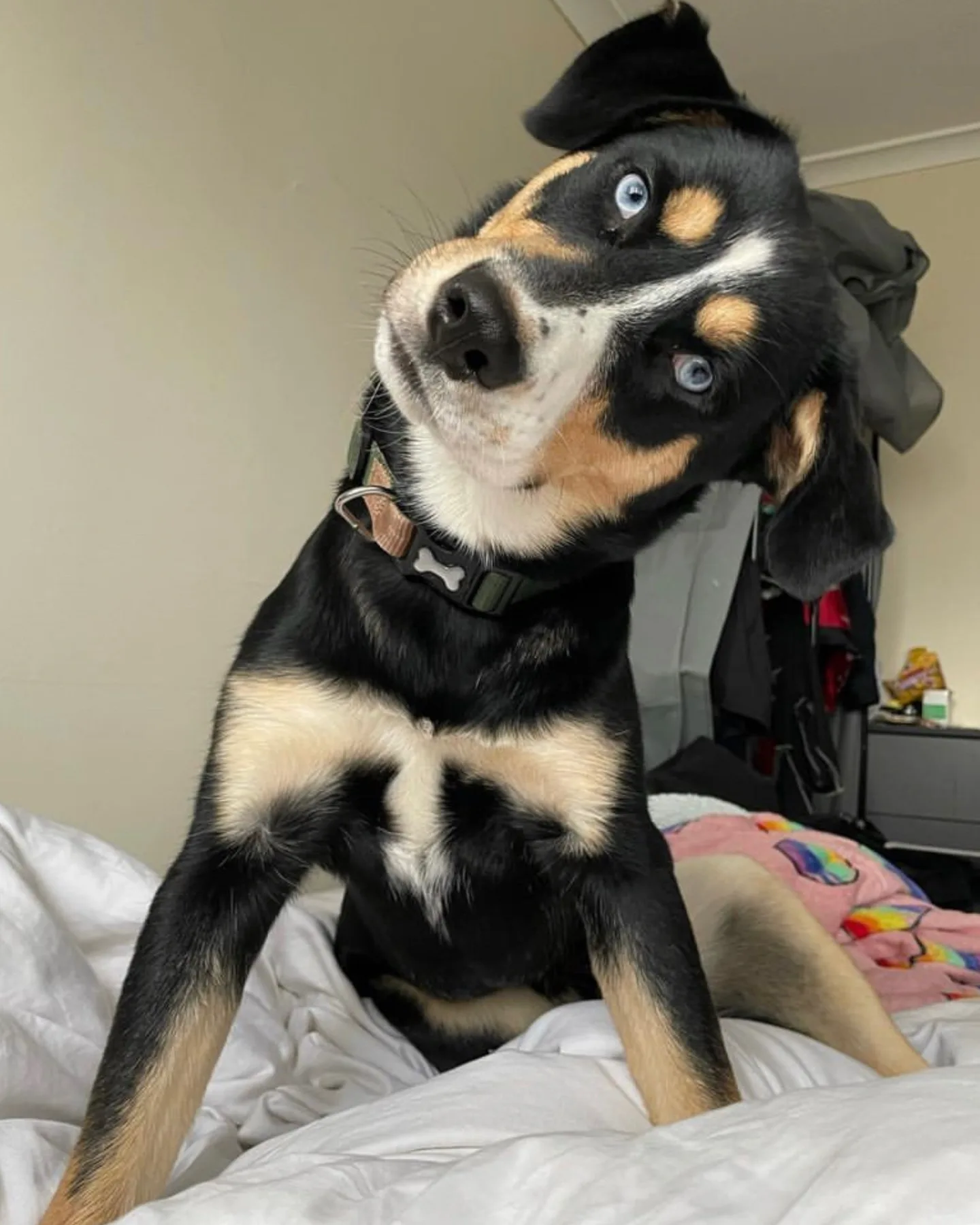
Source: Instagram (@gooserottsky)
8. Health & Life Expectancy
Have you heard about hybrid vigor? It basically implies that crossbreeds are healthier than purebred parents. So, theoretically speaking, Rottskies should be healthier than a Rottweiler or Husky. However, there is so much more that goes into that. Genes are a mysterious thing, and crossing two breeds also means that your dog could inherit any of the diseases that its parents are prone to. That’s why you have to make sure you are buying from a reputable breeder who crosses only dogs that are proven to be healthy.
So, what are some of the diseases that these two dog breeds are prone to? The most common health issues of these hybrid dogs are hip dysplasia, elbow dysplasia, bloat, progressive retinal atrophy, bone cancer, arthritis, and Von Willebrand disease. A lot of these diseases are hereditary, like PRA and hip dysplasia. That’s why you have to make sure that your breeder tests his dogs. Make sure you take your dog to his annual vet visits as well, so even if gets sick, the disease is diagnosed on time.
How long do Rottweiler Husky mixes live?
Now that you know so much about this wonderful breed, you might be wondering how much time he will be around with you. Well, the answer is that it depends. The average lifespan of this breed is between 9 and 13 years. The life expectancy of your dog depends on so many things. It’s similar to us humans. If your dog eats healthy, exercises, and gets the health care that he needs, chances are that he will longer. So make sure you provide your dog with everything that he needs so that he can stay with you for as long as possible.
HEALTH ISSUES | |||
| COMMON | HIP DYSPLASIA | BLOAT | ELBOW DYSPLASIA |
| LESS COMMON | PROGRESSIVE RETINAL ATROPHY | CATARACTS | ARTHRITIS |
| RARE | BONE CANCER | VON WILLEBRAND DISEASE | OSTEO CHONDRITIS |
9. Puppy price & living costs
Rottweiler Husky mixes are by no means inexpensive dogs. And we mean that for both the price of the puppies and the price of living costs. These are large canines, in need of a lot of training. In addition to that, this is a relatively new designer dog, which means that there aren’t a lot of breeders out there. So the price could also go up depending on your location, the current demand, and how many breeders are selling puppies at that given moment.
When it comes to buying a puppy, the price highly varies. It goes from $600 to up to a few thousand dollars. Never look for a bargain when buying a dog. If the price of a dog is too good to be true, it probably is. Be careful about scammers, and make sure you do your research. As for adoption, and adoption fees, you would have to pay somewhere around $200 for it. However, that will depend from rescue to rescue.
How much does it cost to care for a Rottsky puppy?
When it comes to caring for a Rottweiler Husky mix, it could get pretty pricey as well. These family dogs are by no means low-maintenance pups. They need a lot of food, a lot of training, exercise, attention, leadership, and love. Dogs are expensive pets to own, and you have to be certain that you have the financial means that it takes to care for one of them before you decide to adopt one.
So when it comes to the price of living, expect to pay somewhere around $50-$100 for dog food per month. Around $50 dollars for grooming appointments. $30 to $50 a month for dog health insurance. And $50 per dog training class. In addition to that, you will also have to buy things like dog beds, bowls, toys, and puzzles for your Rottweiler Husky pup.
| PRICE | ||
| LOWEST | HIGHEST | |
| PUPPY COST | $600 | $3,000 |
| LIVING COST (PER MONTH) | $90 (FOOD, HEALTH CARE, GROOMING…) | $250 (PREMIUM FOOD, PROFESSIONAL GROOMING, PREMIUM HEALTH CARE PLAN) |
10. Where to buy a Rottweiler Husky mix puppy?
When you decide to get a dog, you always have a few options available. The same rule applies to the Rottweiler Husky mix as well. You can either buy or adopt a puppy. If you decide to buy, you have the option of a reputable breeder, a puppy mill, or a backyard breeder. If you decide to adopt, you can call up your local dog shelters or animal rescues.
As we have already explained multiple times, this is a crossbreed. That means that the Rottweiler Husky mix isn’t recognized by the American Kennel Club. Usually, the AKC offers a list of reputable and registered breeders, that are safe to buy from. But with designer dogs, this isn’t the case. That’s why you have to do your own homework, and make sure you double-check the breeder that you are buying from.
Reputable breeders are the ones who test their dogs to make sure they are as healthy as it gets, and they also often start with the training and socialization process. Reputable breeders usually do charge slightly more, but that additional money is so well worth it. If you are focused on just one specific hybrid dog breed, it could be tricky to find the canine of your dreams in a dog shelter. However, we would still suggest visiting your local dog shelters. You never know what puppy may steal your heart.
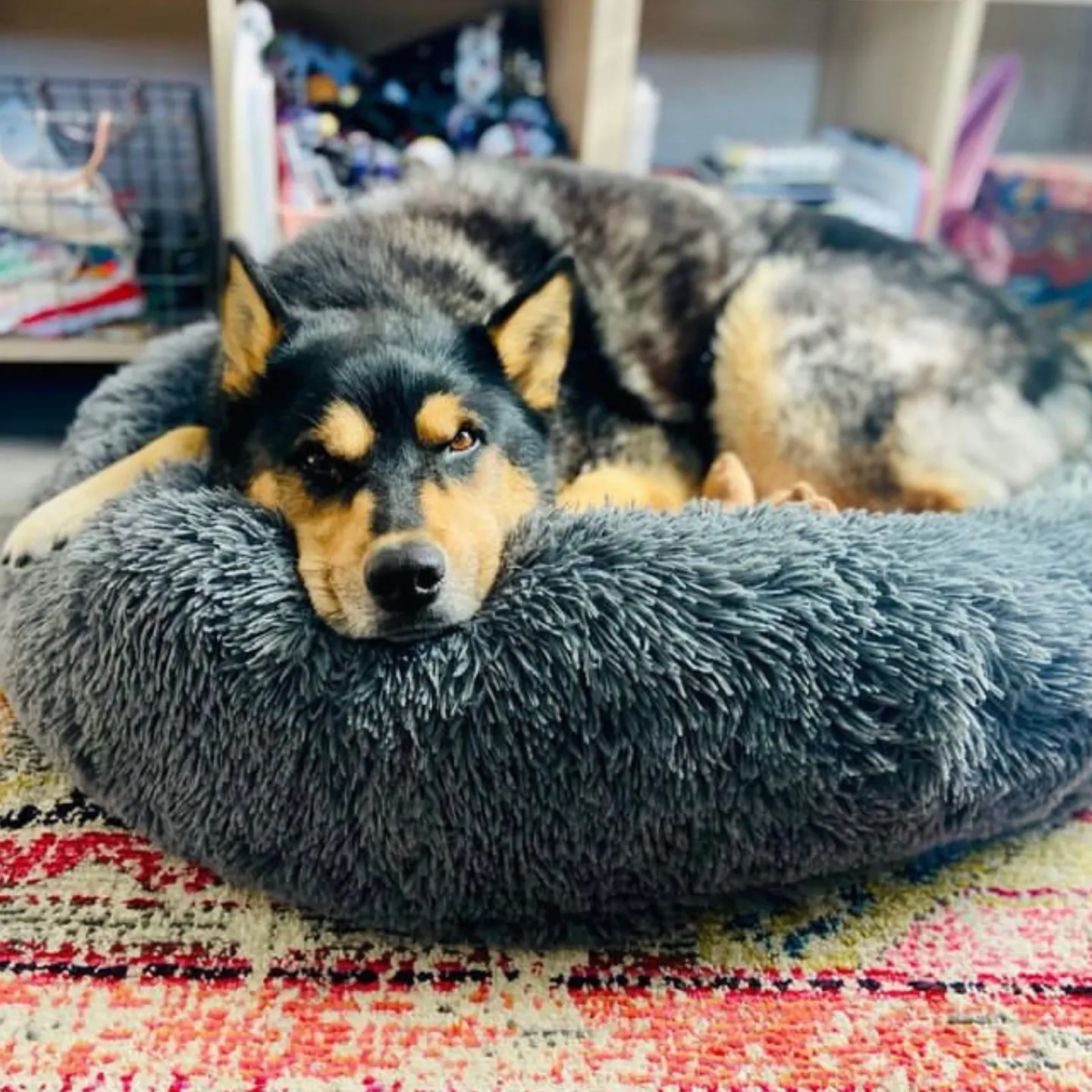
Source: Instagram (@emmazoedogdav)
11. Is the Rottweiler Husky mix the right dog for me?
Only you can give the right answer to this question. As we have already explained, the Rottweiler Husky pup is an intelligent dog that would make the best choice for active owners. These are athletic canines that are the offspring of two working parent breeds, so don’t underestimate their excess energy. Potential owners of this cross breed need to respect their activity levels and give them the exercise they need.
In addition to that, there are also other personality traits that you have to take into consideration. Husky Rottweiler mix puppies may not be the best choice for people with small kids. That’s not because these dogs don’t absolutely adore kids. But because they are so energetic, demanding, and powerful that having a Rottsky and a toddler in the same household could become overwhelming.
But if you do decide that this is the right breed for you, and you are certain that you can fulfill all of their needs, you have to make sure you are buying from a responsible breeder. Make sure your future puppy is cleared of the most common health risks of this breed so that you and your adorable canine can spend a lot of time together in the future.

